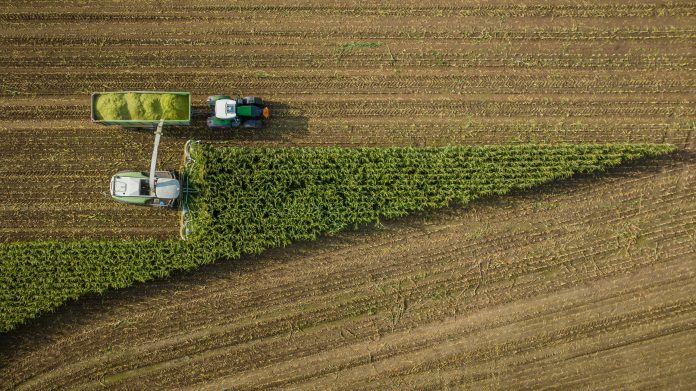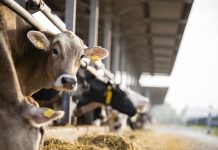Researchers propose rewarding farmers for climate-smart biofuel practices like cover crops and biochar to cut agriculture’s carbon emissions
Researchers are calling for new policies that reward farmers for adopting climate-smart practices when growing crops for biofuels. A new study argues that measures such as cover cropping, reduced tillage, adding biochar to soils, and electrifying farm equipment could dramatically cut the carbon footprint of agriculture. By linking these practices to biofuel incentives, the researchers say agriculture could move closer to a carbon-neutral future while supporting more sustainable food and energy systems.
Climate-smart practices could cut up to 8 billion tonnes of carbon yearly
Research has shown that, if adopted globally, “climate-smart” farming practices have the potential to reduce carbon emissions by 4-8 billion tonnes per year. This would significantly reduce overall carbon emissions, with 2024 figures revealing that global carbon dioxide emissions reached an all-time high of about 40 billion tonnes.
Climate-smart practices include techniques that build soil carbon, like cover-cropping, not tilling fields after harvest, and adding biochar or finely ground silicate rock to soils; and those that reduce the carbon footprint of crop production, like optimising the timing of fertiliser application, electrifying farm vehicles, and improving crop genetics. However, there is no incentive for farmers to use climate-smart practices; therefore, adoption remains limited despite their potential to reduce carbon emissions and enhance soil health significantly.
“Biofuel markets can be a pathway to decarbonise agriculture as a whole,” said Madhu Khanna, a professor of agricultural and consumer economics at the University of Illinois Urbana-Champaign and lead author of the new report. Khanna is the director of the Institute for Sustainability, Energy and Environment and a researcher in the Center for Advanced Bioenergy and Bioproducts Innovation, funded by the U.S. Department of Energy, at the University of Illinois.
“Currently, our biofuel policies don’t reward farmers for adopting climate-smart practices,” Khanna said. “For example, they treat all corn grown for the corn-ethanol market the same, whether or not the farmers adopt those types of practices. By accounting for differences in practices implemented at the farm level and paying a premium for corn grown with climate-smart practices for corn ethanol, biofuel policies can incentivize adoption of these practices.”
Existing biofuel incentives could financially reward farmers who adopt low-carbon, climate-smart practices
Biofuel markets already have systems in place to measure the carbon intensity of different crops and to transfer payments from energy producers to the farmers who grow them. According to the researchers, these existing mechanisms could be expanded to create performance-based incentives that encourage more farmers to adopt climate-smart practices, such as cover cropping, reduced tillage, and soil amendments, helping to reduce agriculture’s overall carbon footprint.
“For example, the ‘40B’ Sustainable Aviation Fuel tax credit of 2023-2024 was designed to differentiate the credit based on the climate-smart practices adopted while producing the crop,” Khanna said. “The lower the carbon intensity, the higher the tax credit paid for sustainable aviation fuels and for the crop used to produce them.”
However, the channels for crediting farmers for soil-carbon sequestration or other climate-friendly practices on the farm are segregated from the markets that provide credits for low-carbon biofuels, Khanna said. To be financially compensated for sustainability efforts, farmers must either enrol in a conservation program or sell carbon credits to one of several companies specialising in agricultural carbon offsets. But, spaces are limited in government conservation programmes, and farmers must also prove they are not already engaging in climate-smart practices to obtain credits, requiring time-consuming efforts for farmers.
Khanna and her team propose that by merging the biofuel feedstock market and the climate-offset market into a single channel, this will effectively reward farmers and others in the biofuel supply chain who use practices that lower the carbon intensity of their operations.
“Emerging digital technologies and modelling advances can document farming practices and accurately calculate their carbon intensity. This can simplify and scale this process,” said Bruno Basso, a co-author of the study and an expert in modelling and digital agriculture at Michigan State University. Certification programs could allow independent verification that feedstocks were sustainably produced.
Incentivising long-term climate-smart practices
One concern is that farmers will implement and then abandon various climate-smart practices. “If they do it one year and not the next, they’ll sequester the carbon and then, perhaps, release it back to the atmosphere the following year,” she said. “But we can design incentives for longer-term soil-carbon sequestration by having farmers sign longer-term contracts. This would relate the size of the payments to how long the farmer agrees to keep that carbon in the ground.”
Khanna acknowledges that the carbon benefits from existing biofuels are controversial. Some critics argue that devoting farmland to the production of plant-based fuels takes up land that can be used for food crops and can contribute to the conversion of forests to cropland in other parts of the world, eroding the sustainability benefits. However, current approaches could be either under- or overestimating the carbon benefits of biofuels by disregarding the carbon effects of crop management practices implemented on the farm producing the crops for the biofuel market.
“By developing a market for agricultural products that accounts for all the direct and indirect carbon emission effects from the farm to the consumer, we can better address these concerns,” she said. “The main premise of our proposal is that we need to have a full and accurate assessment of carbon emissions from the beginning to the end of any product’s life cycle. And right now, the way that biofuel policies are designed, they treat crop producers supplying crops for biofuel as all being the same.”











